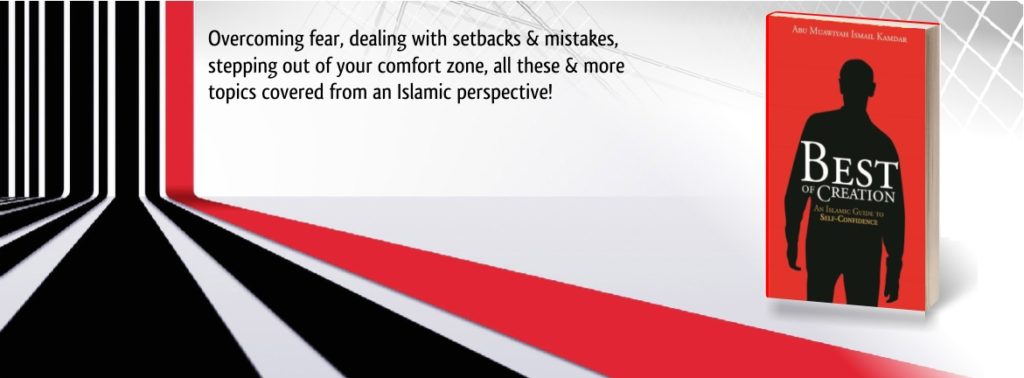
Click on the image to get the full eBook
Dealing with Fear
Note: This is Chapter ten of my eBook Best Of Creation: An Islamic Guide to Self-Confidence.
The Messenger of Allah (peace be upon him) said, “None of you should belittle himself.” They said, “O Messenger of Allah, how does one belittle himself?” The Prophet said, “He finds a matter regarding Allah about which he should speak up but he does not. Allah the Exalted will say to him on the Day of Resurrection: What prevented you from speaking up about such-and-such? He will say: It was out of fear of the people. Allah will say: Rather, it is I who deserved to be feared.”[1]
The single most common obstacle in the way of people’s dreams is fear. There are many types of fear and the negative types hold us back from being the best we can be and accomplishing our goals.
There do exist, however, positive forms of fear. For example, the fear that stops us from swimming with sharks or playing with lions. This is a logical fear and good for us. This kind of fear protects us from doing something dangerous that would harm us.
More importantly, there is the fear of Allah. Out of love for our Creator, we fear displeasing Him and this fear stops us from committing major sins and stops us from persisting at minor sins. This is a positive form of fear that we must grow and embrace, as it is part of Divine Love.
Then we have the negative types of fear. The fear that cripples us and stops us from being our best. The negative types of fear can be summed up as five:
- Fear of failure
- Fear of rejection
- Fear of looking stupid
- Fear of the unknown
- Fear of change
These are the most common fears that stop us from accomplishing our goals, and I’m sure you can relate to some of them, if not all of them. In this section, we will tackle each of these failures with tips on how to overcome them.
“Everything you want is on the other side of fear.” Jack Canfield
Fear of failure
“Only those who dare to fail greatly can ever achieve greatly.”
Robert F. Kennedy
| “Better to try and fail than to fail to try” |
You have a great business idea. It seems like a sure way to make a strong Halal profit, but there is one thing holding you back from pursuing it, you are afraid of failing and losing your capital.
You want to go back to school and get that degree, but you are afraid that your mind isn’t as strong as it used to be and that you might fail. You fear that such a failure will lead to embarrassment and a waste in student fees.
The fear of failure comes in many forms. Even in our spirituality, many people don’t try to be righteous because of their fear of falling back into sin. This aspect was covered in the previous chapter.
The key to overcoming this fear is to embrace failure as just another learning experience, just like mistakes. Failures are another form of mistakes and can be very positive experiences, if we embrace them, learn from them and let go of our fear of them.
Think about the consequences of not trying. If you have a good idea and allow fear of failure to cripple it, you will experience regret and low self-confidence. The regret of not trying can last for life, and is far worse than the experience of failing after trying.
If you try and still fail, you will feel a sense of fulfilment. You will think, “at least I tried and learned from the experience”. Failures are not the end of the world. There exist many people who bounced back from failure to great success.
In fact, a study of the lives of successful people indicates that failure is just a stepping stone to success. Nobody became successful without much trial and error. If you want something, you have to be willing to go through tests first before getting it.
Look at the example of aiming for Paradise. Nobody gets to Paradise due to a perfect life. We all fail many times on the path to Paradise, yet if we persist, we will eventually reach it.
It’s the same with our worldly goals. The Prophet Muhammad’s (peace be upon him) mission to spread Islam in Makkah took 20 years of trial and error to finally meet success. He faced many setbacks, there were times when he felt like he was failing and that success seemed impossible. After 13 years of preaching, he was forced into exile, and had to migrate to Madinah. Yet, with Allah’s Help, miracles occurred and after another eight years of persistence, he entered Makkah as its new conqueror.
If he allowed fear of failure to hold him back, he would never have achieved that goal. Rather, each setback he faced along the way was a learning experience that prepared him for future scenarios and eventually for victory.
Failures, just like mistakes, can be positive experiences, if we embrace them as stepping stones to success and learning experience. Don’t let your fear of failure stop you from trying.
Think of it as a Win/Win situation. Either I succeed, or I learn a life lesson that will help me succeed later. Either way, I can’t lose by trying.
Fear of rejection
You want to propose to the woman of your dreams, but you are afraid that she, or her Wali, will reject your proposal and you won’t be able to handle the rejection. So you never bring up the topic and many years later you still think back and wonder whether she would have said yes.
Your boss is looking for a new idea to improve sales, and you have a great idea that could revolutionize the company. What if he laughs at your idea? What if he thinks it is stupid? You become so paralyzed with fear of rejection that you never share your ideas and as a result, you never rise up the hierarchy at work.
You want to wear the Hijab, but your parents are angry with you and say that no man will propose to you if you wear it. You are afraid of being rejected by your parents or suitors. As a result, you disobey your Creator to please the creation, and find yourself living with the guilt in your heart killing your confidence.
Fear of rejection cripples us. We all want to be loved, appreciated and popular. We find it hard to accept the fact that someone doesn’t like our ideas or our personality. This causes us to pretend to be someone we are not in order to avoid rejection, and that always leads to low self-confidence and unhappiness.
Many people choose to live a lie, in order to avoid rejection. We wear metaphorical masks and pretend to be something we are not, just so that people will love us. Yet doing so destroys us inside.
The first step to overcoming this is to realize that a rejection of your proposals or ideas is not a reflection on your worth as a human being. Do not take everything personally. There are many reasons for rejection.
For example, a woman may turn down your proposal because you are not the right person for her, or she is not the right person for you, but that doesn’t mean the right person isn’t out there. She probably is, and you have to go through a few proposals and rejections before she comes into your life.
Your boss may not like your idea, but he is impressed by your zeal, enthusiasm and courage. In rejecting your idea, he may be watching you more closely to see what other good qualities you have and if you have any other ideas that might work.
A man may reject you because you wear Hijab. So what? It just proves he isn’t the right man for you. Because a man who loves Allah will appreciate that you wear Hijab.
Rejection is a part of life. It is just a stepping stone to success. Many successful people were rejected time and again before their ideas were given a chance and they succeeded.
J.K. Rowling is known today as the author of the best-selling fictional novel series Harry Potter. The first book in the series, though, was rejected by twelve different publishing houses, before somebody gave it a chance. This means she had to deal with rejection a dozen times before tasting even the slightest success.
The story of KFC is even more amazing. When Colonel Harland Sanders retired at the age of 65, he decided to sell his chicken recipe to restaurant owners, who would in turn give him a residual for every piece of chicken they sold–5 cents per chicken. His idea was rejected, by over a thousand restaurant owners!
Eventually, someone gave him a chance and the world renowned KFC franchise was born. He had to grow accustomed to rejection, and deal with it on a level that most people wouldn’t be able to handle.
It is highly unlikely that you will face rejection a thousand times for one idea. It is likely though that rejection is something you will face often when you are out there trying to be your best.
When we learn to accept rejection as another part of life, and nothing personal, it becomes easier to digest. It may still hurt, but the pain is less, and lasts less than the pain of not knowing whether you would have been rejected or not.
Take a chance and ask. At least then you can put your mind to rest and know for sure. This will allow you to move on and not obsess over something that wasn’t meant to be.
Something amazing happens when we build up the courage to face a situation of possible rejection. The experience increases our courage and the next time you are less afraid to try again. Over time, our courage is built up to a level in which we brush rejection aside and accept it as just another stepping stone to success.
In the story of the people of the cave, seven young men were the only believers in their community. Exposing their true beliefs would lead to rejection and possible abuse from their community, but they decided to take a stand and do it anyway. Allah describes the situations as follows, “And I strengthened their hearts when they took a stand and said Our Lord is the Lord of the Heavens and Earth,”[2]
Notice that Allah said He strengthened their hearts when they took a stand. This means that they too were afraid but when they pushed past the fear and did what they had to do, Allah gave them the courage to face whatever challenges came their way. Likewise, when we push through our fears and do the right thing, Allah gives us the courage to continue and rise above the challenges and rejection we face.
Reality is that every prophet and hero in history faced rejection from people. Study history and you will rarely find someone who did not face rejection, and this is what makes them our heroes. They did what others are afraid to do, they faced what others are afraid to face, and they rose up through the rejection and eventually found success. You too can be part of this list by following in their footsteps.
Read the stories of the prophets in the Qur’an. Prophet Nuh (peace be upon him) had to deal with rejection for 950 years. Prophets Hud, Saleh, Lut and Shuaib (peace be upon them) were all rejected by their communities. Prophet Musa (peace be upon him) had to flee from Egypt. Prophet Yunus (peace be upon him) left town because his people had rejected his message. Prophet Muhammad (peace be upon him) migrated to Madinah after ten years of propagation to and rejection by the leaders of Makkah.
Rejection was a daily part of life for the prophets of Allah, and they understood this. Their focus was on Allah and the Afterlife, and they knew that it was Allah’s pleasure that mattered the most.
What will the people Say!
The most common form that this fear appears in is what I call the “What will the people say’ syndrome. Many of us live our lives based on what will the people say. Every decision revolves around pleasing people and avoiding any rejection or criticism.
The result is a false life, low self-esteem and very often the disobedience of Allah in order to please the people.
So do not fear the people but fear Me, and do not exchange My verses for a small price.[3]
If we worry about what people will say, we will never be able to accomplish anything. Understand that for anything you want to do, there will be critics. Not every critic is important. Yes, if the criticism is coming from a position of truth then you should listen to it and follow it.
However, most criticism comes from the low self-esteem of others. They are living a pessimistic false life and feel threatened whenever they see someone genuine who is not afraid to be himself. So they embark on a mission to bring that person down to their level using the most powerful weapon at their disposal, their tongues.
People criticize you because you remind them of who they were, who they could have been and the side of them they suppressed in order to please other people.

Enjoying the Chapter? Get the full eBook here!
True success comes from letting go of this concept and focusing on the pleasure of Allah. One of the qualities with which Allah describes those whom He loves and they love Him is “And they do not fear the criticism of the critics,”[4]
The key to overcoming this fear is to focus on the pleasure of Allah. If what you want to do is Halal, then don’t worry about what people say and do it. At the end of the day, we will all be accountable only to Allah when we die.
Why focus on pleasing people who don’t have influence on your Afterlife, or even your happiness in this world? What makes their opinion of you important? Why do we give people such authority over our lives? These are questions we should ask ourselves whenever we find ourselves fearing what people will say.
“What the world thinks about you does not matter, but what certain specific people think about you matters a lot,”[5]
Fear of looking stupid
You want to learn Arabic or Tajweed but feel foolish to show up for class without basic knowledge in the field. You are afraid of looking stupid if you are unable to grasp the basics of the subject, and as a result you decide not to attend the local classes.
You have a brilliant business idea but have no experience in the field. Fear of looking like a fool holds you back from even trying the idea.
Many of us fail to even get started due to fear of looking stupid. We are so conscious of making a fool of ourselves by stepping outside our comfort zones or learning something new that it paralyzes us. By now, you would have realized that all negative forms of fear paralyze you and hold you back from chasing your goals. The fear of looking stupid is no different.
Most of us tend to dramatize our lives. The crazy scenarios we imagine rarely happen and most people are not even paying attention to whether we look foolish or not, because they too are worried about looking foolish.
Look at the example of attending an Arabic class. Just like you, the rest of your classmates are new to the language and equally likely to make a silly mistake. Everybody is so worried about their own understanding of the subject that nobody is really paying attention to the mistakes of others, and even if they do, they rarely remember it.
The things we want to do are rarely ever as big a deal as we make them out to be. Our drama is usually far bigger than reality. Even your teachers, if they are good teachers, understand that you are new to the subject and likely to make mistakes so they are kind and understanding about it. So what is there really to fear?
If you have a goal, don’t think about how stupid you might look during the early stages of chasing that goal. Focus on the goal, and understand that making mistakes is inevitable. Mistakes are not the end of the world. Any goal worth achieving is worth making mistakes for along the way.
One of the best ways to overcome this fear is to laugh at your own mistakes. It lightens the mood, makes others comfortable and gives you the courage to push on because if anyone is laughing, they are laughing with you, instead of at you.
Fear of the Unknown
“The oldest and strongest emotion of mankind is fear, and the oldest and strongest kind of fear is fear of the unknown” H.P. Lovecraft
Humans are naturally afraid of the unknown and our life experiences tend to build upon such fears. The world can be very risky and often we don’t know what to expect when venturing into a new area. Will it go well or will it go wrong? What will I do if something happens that I never imagined or prepared for?
You want to move to another country but so much about that country is unknowable until you are actually living there. Many people praise the country as a good place to live, yet every place has its flaws. You are afraid of moving, and afraid of any new challenges you may face in the new environment.
You don’t like your job and know of many better opportunities that exist. However, you know your job and have been doing it for a while now. Starting a new job would mean being in an unknown environment, meeting new people and doing new things. The fear of the unknown keeps you locked into a job you don’t like, but know well.
There are several ways to overcome our fear of the unknown. A bit of research can help subdue the fear and replace it with excitement and anticipation. If you are going into a new field, research the pros, cons, benefits and challenges of going into that field, so there are less unknown variables. Likewise, if you are moving to a new country, research the pros, cons, benefits and challenges of living in that country.
Doing our research reduces fear as there are less unknown factors, and more factors that we can prepare ourselves for. Researching the benefits of taking that decision also gives us more incentive to do it, in spite of our fears.
Another important step is to make Dua, and specifically to pray the Istikharah Salah whenever you need to make an important decision. Some people think that Istikharah is only linked to marital decisions. Istikharah is actually a dua we are supposed to make whenever we have made an important life decision, which includes starting a new career or moving to a new area.
Once you have done your research, made dua, and prayed Istikharah, you can now relax and place your trust in Allah. He will not allow anything to happen to you except that which is good for you. Do not worry, and go out and face your fears with Allah by your side.
When you do this, you will find that your fears were unnecessary. Very often the unknown is beautiful, exciting, life changing and beneficial. You wonder what you were afraid of, and you are grateful to Allah for giving you the courage to face your fears and move forward in spite of such fears.
If you are being held back from any important decision due to fear, it is time to let go of it. Trust in Allah, and move forward and you will experience a beautiful adventure that will help you grow to your full potential.
And whoever fears Allah, He will make for him a way out. And will provide for him from where he does not expect. And whoever relies upon Allah, then He is sufficient for him. Indeed, Allah will accomplish His purpose. (Surah At-Talaq 65:2-3)
Fear of Change
A new job, a new home, a new country, a new career, a new spouse, a new child, another change with new challenges. Many people are afraid of change. They want things to stay the same and are afraid of anything that will upset the status quo of their lives.
This fear is irrational, because change is the only constant in this life. Everything changes all the time, and our fear of change will not stop changes from happening.
Look around you and see how much has changed over the years. People have passed away and other people were born. Countries rose to power or fell from power. Technology went through evolutions and revolutions. Change is constant and all around us.
By fearing change, we do not stop it from happening, we instead make ourselves the victims of change. We blame the changes around us for the problems in our lives. Instead of realizing that we are to blame, and the changes are just a part of life.
Embracing change makes you proactive. It helps you to control some of the changes in your life, and to deal adequately with the changes that are beyond your control.
Some things happen in our lives that we can’t control, and they change our lives in major ways. Fear and blame will not help us in such situations. We should approach such situations understanding that whatever Allah allows to happen to us is best for us. Therefore, this change must be good for us in some way.
Perhaps you were forced to get a new job or relocate to a new area, and this meant a lot of changes in your life. There are two ways to can approach this change. You can cry about it, talk about how much you hate change, and become a victim to your circumstance. In doing so, you rob yourself the opportunity of any benefit and destroy your own confidence.
Alternatively, you can embrace the change as Allah’s decree for you, and a new opportunity with new experiences and benefits. In doing so, you approach it with a positive confident mind-set and benefit from the change.
Whether we fear change or not, it will inevitably occur. We need to learn to accept it as a part of life, enjoy it and learn from it. In doing so, we lose our fear, build our confidence and benefit from the experience.
Fear of Allah
“Oh you who believe! Fear Allah as He deserves to be feared and do not die except as believers.”[6]
“Fear Allah wherever you are. Follow up a bad deed with a good deed and it will blot it out. And deal with people in a good manner.”[7]
In moderation, fear of Allah is a positive trait and one necessary for surviving the temptations of this world. As you climb the ladder of worldly success, many new temptations will open up that can take you away from success in the Afterlife. In such situations, it is the fear of Allah that helps us restrain ourselves from giving in to such temptations.
Imagine if you overcame all your other fears and became someone rich, powerful and successful. Suddenly the treasures of this world lie before you and the only thing standing between you and abusing them is your relationship with Allah. This relationship is the most important thing in the world and crucial for staying on track during times of temptation.
In Surah Al-Kahf, there is a parable about a man who attained such success. He was a farmer and Allah describes him as a man who had it all; cultivated fields, grape-vines, date palm trees with a river flowing in between, and every year all of his crops would make a profit.
This man failed the test of success though. His success made him arrogant, he began to boast about his wealth, and he forgot to thank Allah for blessing him with it. His neighbour reminded him to thank Allah before his wealth is taken away, but he ignored the warning. Eventually, the man lost all of his wealth and regretted it. This is what happens when someone has worldly success, without the fear of Allah.
Give them the parable of two men; to one of whom I gave two gardens of grapes, each surrounded by date palms and separated by cultivated fields. Each of the two gardens bore fruit without any loss and I caused a river to flow between them.
He had a lot of property so he mentioned to his companion, while conversing with him, “I have much more wealth than you and more people.” And he entered his garden, while being unjust to himself, saying, “I don’t think that this will ever perish, and I don’t think the Hour will ever come. And, if indeed I am brought back to my Lord, I will surely find better than this when I return.”
His companion said to him, during his discussion, “Do you disbelieve in Him who created you out of dust, then out of an oily drop, then fashioned you into a man? But to me, He is Allah, my Lord, and I will not associate anyone as partner with my Lord. It is better for you to say, when you entered your garden: Mashaa Allah (This is as Allah has willed) There is no power except by Allah’s permission,’ (listen to my advice) even though you see me having less wealth and children than you.
Perhaps my Lord will give me something better than your garden. And He may cause destruction to descend on your garden from the sky, and turn it into smooth featureless land, or the water may sink so deep into the earth that you would never be able to reach it.”
So the fruit of his labour became surrounded by ruin. And he began rubbing his hands in regret over the effort he had spent on it, while it was all destroyed on its trellises. He could only say: “If only I had not associated any partners with my Lord!” And he had no group of men to help him against Allah, nor could he save himself. In such circumstances the only support comes from Allah, the true God. His reward is best and the best ending.[8]
The fear of Allah should be an extension of our love for Allah. We love Allah so much that we fear displeasing Him. It must also be balanced with hope in Allah’s Mercy, so that it does not become a negative quality and lead to despair.
The way this works is that whenever we feel tempted, we remind ourselves to fear Allah and avoid giving in to temptation. But should we give in to temptation during a moment of weakness, at such times we need to focus on Allah’s mercy, repent and try again to get back on track.
This dual system is necessary as fear without hope leads to despair and hope without fear leads to complacency. Both of which will get in the way of success in both worlds.
A believer must cultivate his relationship with Allah at all times, whether good or bad, and keep this connection strong. The method for doing so was listed in an earlier chapter.
A Final Word on Fear
Being afraid is natural. Do not feel alone if you are afraid to do something. Whether the fear is fear of failure, rejection, change, the unknown or looking stupid, it is quite common to find many people experiencing such fear.
Every human experiences fear. The only difference between those who accomplish their goals and those who do not, is that the former push through their fears while the latter are inhibited by theirs.
You too can be of those who push through their fears. You just need to believe in Allah, trust His Wisdom, plan to the best of your ability, and then jump into it. In the end, you will get what you wanted or learn from the experience.
That was Chapter Ten, out of thirteen chapters, from my 200 page eBook ‘Best Of Creation’.
Click the link below to purchase the full eBook!
Buy Now
[1] Ibn Majah 4008
[2] Surah Al-Kahf 18:14
[3] Surah Al-Ma’idah 5:44
[4] Surah Al-Ma’idah 5:54
[5] Mirza Yawar Baig, 20.10.2010-55, p. 37
[6] Surah Aal-Imran 3:102
[7] Sunan At-Tirmidhi
[8] Surah Al-Kahf 18:32-44
 3 Self Confidence tips you can apply today!
3 Self Confidence tips you can apply today!


 Ramadan 2016 Special Prices
Ramadan 2016 Special Prices






